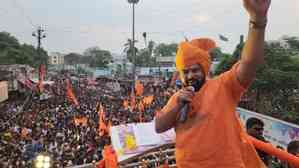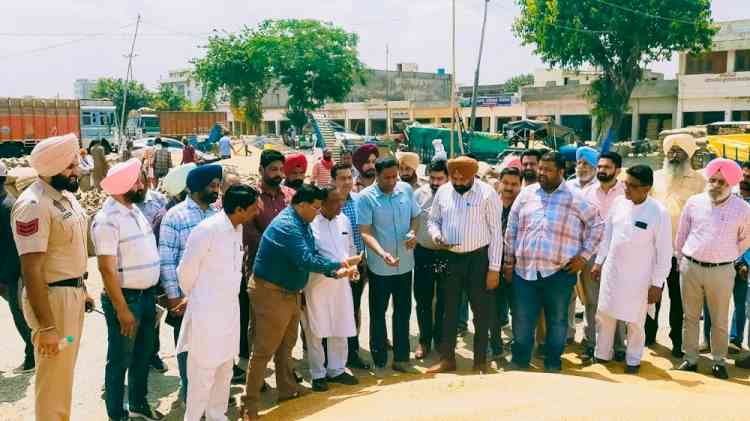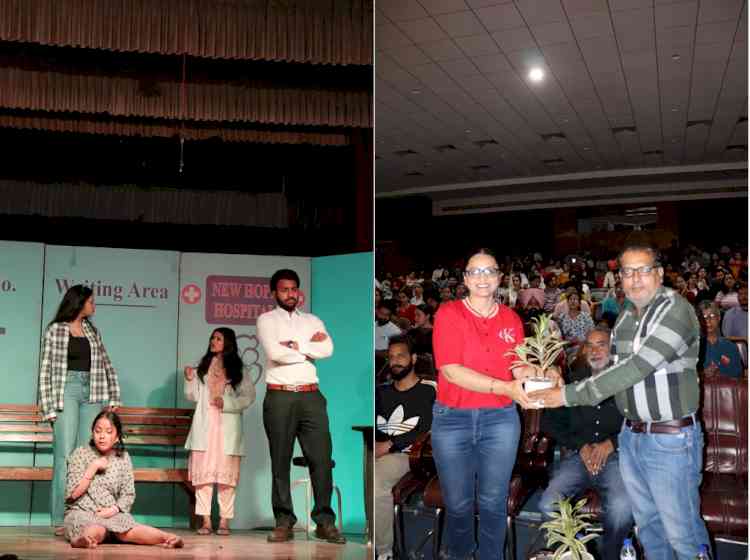Punjab Pradesh Beopar Mandal submits memo to Ludhiana DETC, JK Jain, seeking clarifications on GST
Author(s): City Air NewsLudhiana, July 13, 2016: Punjab Pradesh Beopar Mandal has submitted a memorandum to JK Jain, DETC, Ludhiana, and puts its point of view on GST and seek clarifications on certain points regarding GST bill pending...


Ludhiana, July 13, 2016: Punjab Pradesh Beopar Mandal has submitted a memorandum to JK Jain, DETC, Ludhiana, and puts its point of view on GST and seek clarifications on certain points regarding GST bill pending in the Rajya Sabha.
The memorandum was signed by the mandal’s state president Amrit Lal Jain, general secretary Sunil Mehra and secretary Mohinder Aggarwal. A copy of the memorandum is in possession of City Air News, which reads as under: “In the Budget speech of 2005-06 Mr. P Chidambaram then Finance Minister, Govt. of India set the goal of goods and services Tax(GST).
The fundamental objective of GST is to redeem the promise of article 301 in part XIII of the constitution of India: “Subject to the other provisions of this part, trade, commerce and interstate throughout the territory of India shall be free”.
The BJP(NDA) Govt. introduced the constitution(122nd amendment ) Bill in December 2014.
The trading community of the country is surprised that GST Bill which is passed by Lok Sabha and pending in the Rajya Sabha effects 5 crores traders and industrialists of the country knew nothing except what they are reading in the newspapers. In the beginning it was said that the GST will be uniform and there will be only one tax under GST regime and its collection will be distributed amongst the states. We welcome this type of GST but the truth is just the opposite. The main benefits of GST regime promises is a reduction of multiple taxes which is a good step, if GST is only on the pattern of other countries.
1. Article 246 A now confers power on parliament and every state legislature to levy goods and service tax. Thus, we are likely to have one parliamentary law and about 28 state laws that will levy GST and there is no constitutional requirements that all the state laws be uniform. It will prove to be a like Vat Act 2005.
2. How we are going to merge existing laws on Excise duty, Vat, Service Tax together. This is a dangerous area of darkness.
3. There is still uncertainty about the final GST rate or rates. We doubt even a multiple GST levy of even 16/18 % is bound to result in large scale tax evasion at the retail level.
4. While most countries(about 132) have a single GST only a few have a dual GST. The Indian version is likely to be most complex with different states enacting their own laws. It may prove to be unsuited to a vast, heterogeneous country like India. Indeed, the needs of states like Maharashtra and Gujarat are completely different from states like Punjab, Haryana, H.P, Jharkhand etc.
5. The GST is a merger of central and state levies administered by central and state government officials. How many assesses will we have state-wise? Who will administer a combined GST? Will each state insist on administering the GST within its territory? If so, there will be no role of the central excise or service tax departments, except in inter-state transactions. Which are the appellate authorities? Will there be one tribunal or multiple tribunals?
6. There will be three types of GST registration as per requirements of the dealers. Central GST (CGST), State GST(SGST) and Integrated GST(IGST). Tax payers will be require to make payments of CGST,SGST,IGST. Integrated GST is against the basic spirit of GST and perhaps this type of GST is nowhere in the world.
7. Exporters currently have the option to avail of duty free inputs but under the GST regime, this option may not be available. “This may lead to serious blockage of funds for exporters”. To get the refunds are likely to face same fate and music as happening in Vat refunds.
8. What are the taxes that will be continued alongside GST and excluded goods(vat free) and services? Why petroleum products, Tobacco and electricity are being excluded from GST.
9. Have the states agreed to dismantle all check posts, ICC and entry barriers before GST regime is enforced.
10. Is the IT back bone to support the administration of GST fully ready in place?
11. Under Integrated GST will present C-Forms will continue?
12. Will transfer of goods will be allowed under GST without charging integrated GST?
13. Is there will be a constitutional guarantee that under GST regime no State Government will impose any type of tax like entertainment tax, entry tax, Purchase tax, Luxury tax etc.
14. Is there will be one accessing authority or GST dealer have to access its account separately before the state and central authority.
15. Under GST regime there should not be any immunity to officials who will deal with the GST regime, they should be accountable as under vat act officials are not accountable. They should also be a provision of sentence of five years on GST officials as it is determine for a traders. Both should be at equal part.
16. Whether GST shall be applicable to the state of J&K?
17. A number of states to attract investment from within and outside country to setup industrial houses have offered a number of incentives including Vat exemption up to 80% from 5 to 10 years. After the implementation of GST what is the fate of these incentive?
18. Under vat regime vat refund is intensely delayed by the department due to paucity of funds with the state govt. and it always remain between 4 to 5 hundred crores in a small state of Punjab. What is the guarantee under GST regime what will be the fate of the beoparis.
19. GST is levied –what will be the criteria of Refund on our stock on which Excise duty & VAT is already paid.
20. Tribunal : who will listen cases pending/ new cases of State and Central GST. There will be one tribunal or two tribunals.
21. Is the software of the state govt. is ready to cope with the GST law as state govt. failed to implements its promises of online of C-forms for the last two years. Department software breaks down frequently. There should be provision of penalty on the harassment of the GST officials whether state or central. The traders should be ensure that no state will levy any tax after changing its name and rates will be uniform on each and every item throughout the country. Guarantee should be given in the GST law.
22. Rules and regulation of GST law put up by high empower committee running in to 190 pages should be made available by the department in English, Hindi and Punjabi in our state and department should the point high officials to interact with the trade and industry association and reply their points which they raise after going through the contents of these rules and regulation
Aggarwal told that DETC, Ludhiana has assured them to forward the memorandum to higher authorities for taking necessary action in this regard.

 cityairnews
cityairnews 
















